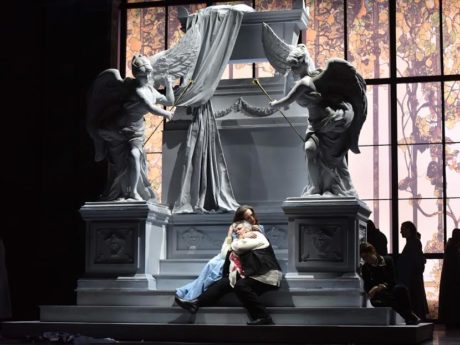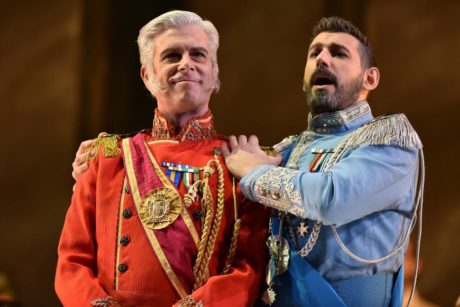A company premiere and part of its Opera at the Academy series presented in the historic Academy of Music, Opera Philadelphia’s production of Tancredi, from Opéra de Lausanne and Teatro Municipal de Santiago, is at once grand and intimate, florid and quiet, updated but timeless. Based on Voltaire’s play Tancrède (and borrowings from Ludovico Ariosto’s epic poem “Orlando Furioso”), the story of love, conflict, war, and heroism in medieval Syracuse has here been relocated to western Europe in the era of World War I. The more recent design brings greater visual immediacy to Gioachino Rossini’s lyrical music (his first opera seria, which he composed in 1813, at the age of 20) and Gaetano Rossi’s dramatic libretto–the happy ending of which was soon reworked to adhere to Voltaire’s original tragic conclusion, leaving posterity with two different versions of the work. The current production, performed in Italian with English supertitles, uses the latter for its melodramma eroica in two acts.

Renowned mezzo-soprano Stephanie Blythe makes a highly anticipated return to Opera Philadelphia for her stage debut in the titular ‘breeches role’ of Tancredi, the exiled soldier who fights to defend his embattled homeland and his love Amenaide, falsely accused of treason and condemned to death. Though it is admittedly difficult to suspend our disbelief of a woman singing the part of a man (as conceived by Rossini, and not uncommon in classic opera), Blythe commands the stage with her powerful presence and torment, from her character’s famed aria “Di tanti palpita” to the dying hero’s hushed introspection in the tragic “Finale”–a heartrending conclusion and a soft but stirring highlight of the production.
A stellar performance by soprano Brenda Rae, in both her company and role debut as Amenaide, affirms her consummate mastery of Rossini’s elaborate ornamentations and her engaging acting skills, as she constantly astonishes with her pure mellifluous voice, flawless execution of extended passages of coloratura, and profound emotional commitment to the compelling role of an honorable woman who would sooner give up her own life than betray her true love. She is poignant and prayerful as she petitions God to protect her beloved in “Gran Dio! Deh! tu proteggi” and in her hope that Tancredi will believe in her innocence after she is dead (“Di mia vita infelice”). Along with their expressive solos, Rae and Blythe capture the spirit of the couple’s ill-fated relationship and the lyricism of Rossini’s bel canto style in the captivating duet “Lasciami non t’ascolto”—another high point of the opera, and of their performances.
Also making their full-stage role debuts are emerging tenor Michele Angelini as Amenaide’s conflicted father Argirio, torn between his patriotic duty and the daughter he is led to mistrust, and local baritone Daniel Mobbs as the scorned and vengeful Orbazzano. Mezzo-sopranos Allegra De Vita and Anastasiia Sidorova lend their respective talents to the portrayal of Amenaide’s loyal friend Isaura, and the ‘trouser role’ of Roggiero, attendant to Tancredi.
Director Emilio Sagi strikes a balance between the breadth of the ensemble scenes and the pensive focus of the soul-searching individuals. He uses the stage to full advantage with his dramatic blocking, alternating between centralized axial arrangements and asymmetrical placements, even employing the actual architecture of the venue beyond the bounds of the scenic design, as the distraught Amenaide supports herself on one of the Academy’s majestic 19th-century columns. Our eyes follow the characters around the space and through their journey, always maintaining our rapt attention. Sagi is well-paired with Opera Philadelphia’s Music Director Corrado Rovaris, a Rossini expert who conducts with appropriate buoyancy, urgency, and gentleness, from the glory of the familiar “Tancredi Overture” to the sounding of the heralding trumpets to the lightly plucked strings that speak volumes—all perfectly modulated with the emotional tone of the vocals and the content of the narrative.
The artistic design team provides a beautiful complement to Rossini’s music and effective support of the production’s modernized conception. Daniel Bianco’s monumental set evokes the architectural grandeur of the Hall of Mirrors at Versailles, where the treaty that brought an end to WWI was signed in 1919. The colossal funerary monument in Tancredi’s final death scene also conforms to the classical Baroque style of the 17th-century French palace, while graceful paintings of foliage in the style of Tiffany glass (produced from 1878-1933, and encompassing the years of the First World War) are seen through the towering wall of windows that serve as a backdrop. Exquisite lighting by Eduardo Bravo shifts with the times of day and the changing locales, and highlights the protagonists’ situations and moods. Lavish costumes by Pepa Ojanguren reflect the fashions and military uniforms of the period; Amenaide’s glittering gown and tiara are especially sumptuous.

Although there are some inevitable anachronisms (including archaic references to the Byzantine Empire and the Saracen armies), the modern context of the production serves to underscore the universal pan-temporal themes of socio-political hostilities and personal discord. Opera Philadelphia’s Tancredi dazzles with its beautiful music, grandiose design, and compelling human drama, which remains relevant for all times and all places.
Running Time: Approximately three hours, including a 20-minute intermission.
Tancredi plays through Sunday, February 19, 2017, and is presented by Opera Philadelphia, performing at the Academy of Music – Broad and Locust Streets, in Philadelphia, PA. For tickets, call (215) 893-1018, or purchase them online.





Brava, Deb Miller ! What an excellent, precise & right on the money review of OCP’s “Tancredi”, which I saw on Sunday, 2/12/17. You hit all major points, though you might have said a bit about the quality of the male performances. I, too, think this is a terrific production and was knocked out by the singers, especially the two female leads, but also enjoyed the “guys”. Production wise, this is a stellar production. Having previously heard both Marilyn Horne & Ewa Podles perform “Tancredi” live, I can enthusiastically recommend this go round to any & all who love great singing in a fantastic production.
Thanks for your insights, John Quigley
Brava, bravo, bravi! Thank you for this most wonderful production!